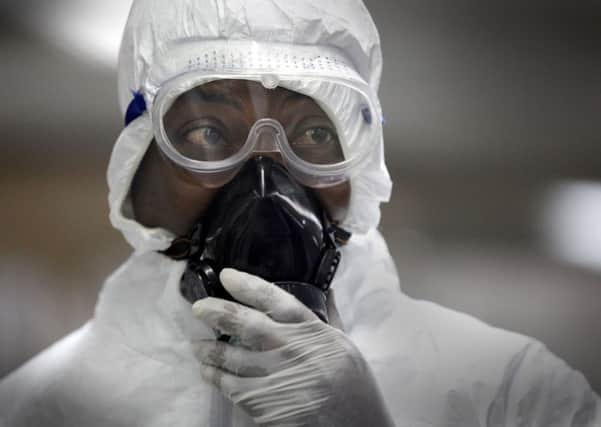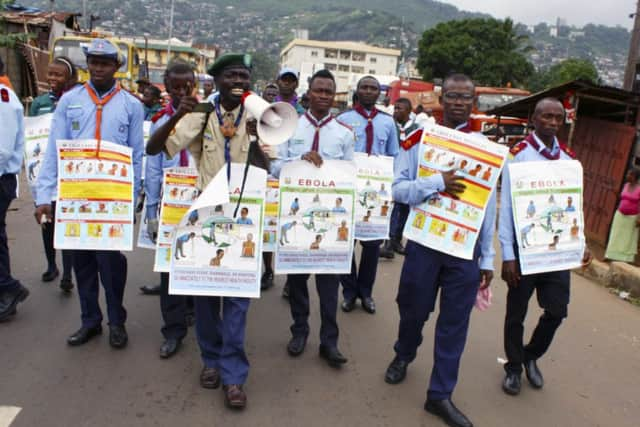Anna Burnside: Ebola, the epidemic of ignorance


Some were missed altogether.
Once the flu-like stage passes, the haemorrhaging starts. This is an alarming, ugly disease. Blood may appear in vomit, urine or diarrhoea, then from under the skin, from the eyes or from the mouth. Inside the body, blood vessels begin leaking. As the blood pressure drops, the heart, kidneys, liver and other organs begin to fail. Survival rates vary, although none are higher than 50 per cent. The most pessimistic assessments say 90 per cent of people infected with Ebola go on to die of the disease, usually within weeks.
If only this was just the plot of a horrific science fiction movie. To date, 932 people have died of Ebola, in Guinea, Liberia, Sierra Leone and Nigeria. A further 1,711 are known to be infected. The virus is spread through body fluids and close physical contact; medical staff wear the kind of hazard protection gear more commonly associated with a nuclear reactor in meltdown. There is little they can do for their patients and the health services in Liberia and Sierra Leone, the worst affected countries, are crumbling under the pressure. Hospitals are overflowing while terrified, pressurised staff are walking away from their posts.


Advertisement
Hide AdAdvertisement
Hide AdMeanwhile in America two medical missionaries, air-lifted from Liberia to an isolation unit in Atlanta, are being treated with an experimental drug, ZMapp, which has not been approved by the American Food and Drug Administration. It is produced by a tiny biotech firm, Mapp, in San Diego and it has yet to be tested on humans. They appear to be recovering, but there is no way of assessing whether or not this is down to the drug. Some patients given treatment for dehydration, fever or antibiotics for side infections caused by the haemorrhaging, do survive.
Mapp, which is under pressure to scale up production, is struggling to produce more of what is being called “the secret serum”. The Nigerian health minister, Onyebuchi Chukwu, was told last week that there were such small quantities available that West Africa would have to wait for months for supplies.
Even if they were available, is it ethically acceptable to use an untested drug on people who are already extremely ill? ZMapp, which contains antibodies that specifically attack the Ebola virus, is a type of drug that has a proven track record. Even so, the normal procedure is first to test a new drug on healthy humans, to assess its side-effects. And if it is acceptable, why has it been given to two white missionaries instead of the thousands of Africans who also have the virus and who are not benefiting from the world-class medical care available in Atlanta? To address this, and other unresolved issues surrounding the Ebola outbreak, which is perceived to have caught it on the back foot, the World Health Organisation has convened a two-day emergency meeting in Geneva this week.
There, experts will decide whether to classify the epidemic as an international public health emergency. They will also look at ways of helping the organisations working on the ground and consider extending the use of ZMapp and other untried treatments.
Within the medical and aid communities, there is widespread anger at the paucity of treatments available. Hannah Spencer, from Surrey, a Médecins Sans Frontières (MSF) volunteer doctor who returned from Liberia last month, says: “It’s frustrating that there is no specific cure for Ebola. I feel sure that if it affected people in the West then a lot more would have been done to find a cure or a vaccine.”
Ebola is far from the only under-researched tropical disease. There is still no vaccine or cure for malaria (which the WHO estimates killed 627,000 people, mainly African children, in 2012). Yet Aids, which was discovered in the same year as Ebola, is now widely treated with anti-retrovirals and is no longer a death sentence. Aids, while prevalent in Africa, also affects thousands in Western countries with sizable health budgets. It does not take a conspiracy theorist to ask some basic questions about why one is now being successfully treated while the other is killing hundreds, with the possibility of thousands more to follow.
Meanwhile, in the absence of alternatives, Liberia and Sierra Leone have put large areas of their countries under quarantine. Liberian president, Ellen Johnson Sirleaf, declared a 90-day state of emergency on Wednesday, with police and army checkpoints around the affected counties. In Sierra Leone, soldiers in full riot gear are guarding the roads into the two worst affected areas in an attempt to control the spread of the virus.
Ebola, which was discovered in 1976, is new to this area of West Africa. It is spread by contact with bodily fluids: blood, vomit, saliva, semen. The virus can survive on surfaces, so any contaminated object, such as a latex glove or a hypodermic needle, can harbour the disease. The public health messages that have kept it under control in the areas of east Africa where it started are just beginning to make an impression in the newly affected areas, many of which are remote villages. Preventive measures, carried out by staff in full hazard kit, can seem as alarming as the disease itself. There is still widespread fear, ignorance and misunderstanding.
Advertisement
Hide AdAdvertisement
Hide AdTim Jagatic, a doctor working with MSF, explains: “In Guéckédougou, in Guinea, a person died in their village. The next day, health workers showed up in ‘space suits’ and started spraying everything with disinfectant. And then more people started dying. So it seems to them like after we showed up with the spray, more people died. And they say, ‘Oh, so you’re spraying Ebola in our village.’ It’s difficult to explain that there’s something so small, you can’t see it with your own eyes, but it’s one of the deadliest things. We take for granted our basic level of education in the West.
“The biggest point of fear is the unknown. They know something bad called Ebola is in their community, and it’s killing people they know and love, and they don’t know how to stop it.”
Hand-washing stations have appeared in public places throughout the affected countries and health workers with posters and megaphones are out spreading the message. Early on in the outbreak people were advised not to shake hands – a common greeting for men in this part of Africa – or kiss. In March, Liberia’s health minister advised people to stop having sex.
As the death toll rises, burying the dead has become a particularly vexed issue. The body of a person who has died of Ebola is highly contagious. The traditional west African practice, where village elders would prepare the corpse by washing the body and braiding the hair of a woman, and mourners touch and kiss the corpse, carries a high risk of infection. Experts reckon that funerals speeded up the early spread of disease. (Many of the other early casualties were family members, who had cared for sick relatives at home.)
In hospitals, corpses are dealt with by cleaners. (These will be local staff, while the doctors and nurses are likely to be from international aid organisations.) Many of these young men are uncomfortable taking on a role associated with age and seniority. They have also been ostracised within their communities.
Ane Bjøru Fjeldsæter, an MSF psychologist, counsels frontline medics. She says: “I was expecting the Ebola epidemic to be quite gruesome and unlike anything I had seen before. But I really didn’t expect its magnitude – this outbreak is enormous. In Sierra Leone, it killed off a lot of health workers before MSF even arrived.
“The cleaners have the hardest job of all, because they are the ones dealing with the dead bodies. In an area with an unemployment rate of 95 per cent, they jumped at this opportunity to get a job. They are the ones who mop up the vomit, stools and blood. And when there’s a death, they are the ones who retrieve the dead body from the isolation ward, put it in the morgue and disinfect it.
“Traditionally, in Sierra Leone, dead bodies are taken care of by the tribal elders. A lot of the hygienists feel they are too young to be dealing with the dead – they feel they’re being disrespectful of their culture’s traditions.”
Advertisement
Hide AdAdvertisement
Hide AdMSF staff, says Fjeldsæter, works hard to counter the stigma these workers face at home. “We tell them, ‘You are heroes, you’re doing a very important service for your community – it’s absolutely vital that someone is doing this job.’”
It’s hard to avoid the conclusion that the current response to the Ebola epidemic is little more than fire-fighting, panicking and hand-wringing. “We need twice as many people,” states MSF’s Jagatic. “We simply don’t have the numbers to delegate all the things that have to be done when we’re in the isolation ward.” There, the full protective kit that every doctor and nurse must wear at all times is unbearably hot, limiting the time available to spend with patients.
“We would like to keep a visit between 45 minutes and one hour, but now, we’re stretching it to almost two hours. We put ourselves through a very strong physiological stress when we’re using personal protection gear, because it’s impermeable. We sweat, we’re losing water; we’re getting hotter and it wreaks havoc on the body. Our own endurance starts to wear down.”
Cathy Ratcliff, head of international development at Edinburgh medical charity EMMS International, says that it is almost impossible for us to grasp the level of poverty and lack of understanding that is the context for the Ebola outbreak. “There is so much ignorance, so many differences of opinion. We have health messages directed at us from the day we are born. It is very different if you can’t read, if you have hardly been to school.
“And then there are really basic things: you need access to clean water and soap to wash your hands. It’s down to more than just knowledge. It’s very hard for us to appreciate just how little some people have.”
Hannah Spencer of MSF sees organisation as the key. “To treat the outbreak adequately, we really need an integrated approach between the governments in the region and other non-governmental organisations. We need a lot more medical staff who have experience with Ebola and we need a lot more people spreading health promotion messages and tracing everyone who has come into contact with people who have the disease. This is the only thing that will really bring the outbreak under control.” «
Twitter: @MsABurnside